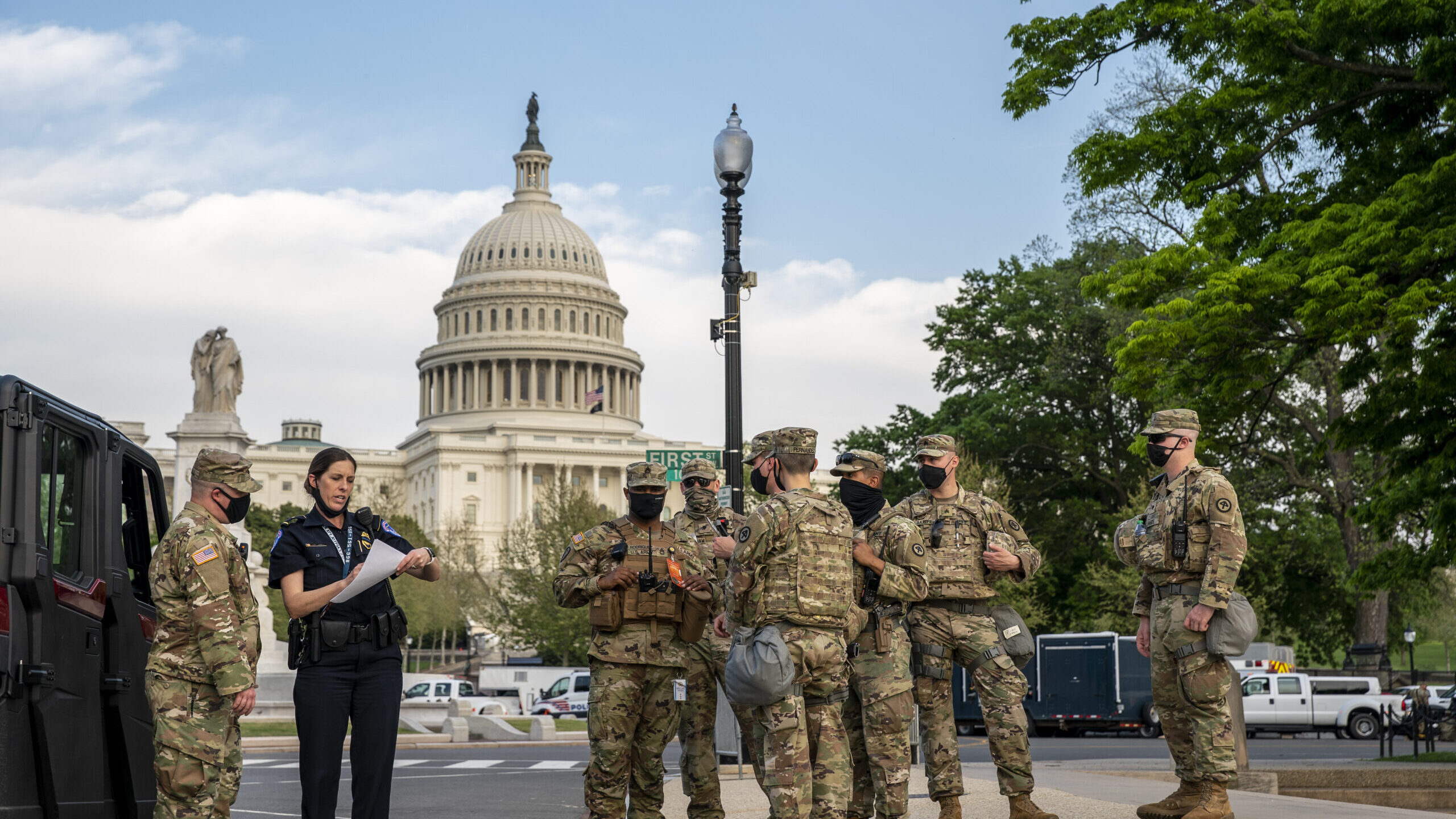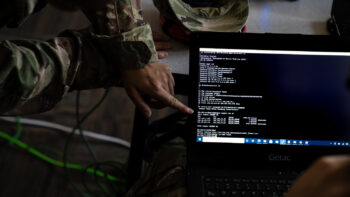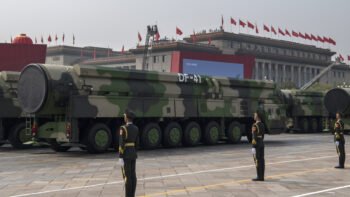
Military personnel and Capitol Hill Police department stage outside the US Capitol before U.S. President Joe Biden will address a joint session of Congress in the House chamber of the U.S. Capitol April 28, 2021 in Washington, DC. (Photo by Tasos Katopodis/Getty Images)
WASHINGTON — The House passed the $883.7 billion National Defense Authorization Act in a narrow 217 to 199 vote today, after the addition of a laundry list of GOP-backed amendments on abortion and other culture war issues threatened the bill’s usual bipartisan support.
Votes were largely along party lines, with 196 Democrats opposing the measure and a small group of six supporting it. Republicans overwhelmingly backed the bill, with 211 voting in favor and just three voting against.
After the passage of a list of hardline conservative amendments last night, eight Democratic members of the House Armed Services Committee — including the committee’s ranking member, Rep. Adam Smith of Washington state — released a statement condemning the changes to the NDAA and recommending members vote against the bill.
“The adoption of poison pill amendments attacking reproductive health care, women, LGBTQ+ individuals, and people of color undermines the purpose of the defense bill by demeaning service members and degrading our national defense. That is why we oppose the final passage of the NDAA, as amended, on the House floor,” wrote Joe Courtney, D-Conn., John Garamendi, D-Calif., Donald Norcross, D-N.J., Ruben Gallego D-Ariz., Seth Moulton D-Mass., Ro Khanna D-Calif., and Andy Kim D-N.J.
For in depth details on what is included in the House NDAA, read:
- HASC adds Virginia-class sub, cuts F-35s in $849.8 billion draft defense policy bill
- HASC greenlights draft NDAA, sends $883B bill to full House
The NDAA typically achieves overwhelming bipartisan support, and an earlier version of the bill coasted to the House floor on the back of a 57-1 vote that saw Khanna as the only member of the HASC to vote “no.”
Throughout the debate, Smith warned that while he supported the NDAA in the state that HASC left the bill, the addition of far right-leaning amendments would trigger most Democrats to vote against the bill — potentially endangering passage in a House where Republicans have only a five member majority.
In remarks ahead of the final vote, Smith said that “98 percent” NDAA remains a “very, very good bill” at its core, but raised three main objections: the abortion travel ban, two restrictions on health care for transgender individuals, and several amendments that curb the Pentagon’s diversity, equity and inclusion efforts.
Over the past three days, lawmakers debated more than 350 amendments on the House floor, mostly concerning personnel and policy issues, as is typical. Some of those amendments include:
- An approved amendment that establishes an expert panel to review contracts for major weapons programs, spare parts, and services to determine whether the Pentagon paid excessive prices, and to make recommendations aimed at achieving fair prices in future contracts
- The adoption of an amendment that prohibits funds to be used for certain executive orders on climate change
- An adopted amendment that requires a plan to “restore” the “nuclear capacities” of the B-52 bomber
- An approved amendment that bans drag shows and other drag-related events
- The approval of three measures to eliminate the role of the Defense Department’s chief diversity office, eliminate all diversity, equity and inclusion (DEI) related offices inside the Defense Department and military and institute a permanent hiring freeze on all jobs related to diversity, equity and inclusion, which was passed by voice vote
- A failed amendment to ban all funding for Ukraine, which was defeated 74-373
- A failed amendment to ban the transfer of cluster munitions, which was defeated
- A failed amendment to prohibit all Pentagon spending on NATO unless all other member countries spent the recommended 2% of gross domestic product on defense, which was defeated 81-346
The approval of the House version of the bill comes as the Senate Armed Services Committee releases its own iteration of the defense policy bill. Both committees must agree on a compromise version of the bill that will be taken up in its final form by both the House and Senate a second time, and right-leaning provisions are likely to be a nonstarter in the Democrat-led Senate.
The White House has not weighed in on the current version of the NDAA but is certain to reject the hardline conservative provisions. In a statement of administration policy [PDF] earlier this week, the Biden administration praised HASC’s version for the changes it proposed to the military justice system and for funds that support US troops in Europe and the Indo-Pacific.
However, the administration also laid out a list of NDAA provisions it labeled as concerning, including the addition of a Virginia-class submarine, the removal of funds for the Constellation-class frigate, the mandated creation of an East Coast missile defense site, and the establishment of a drone corps for the Army. It also raised objections to the junior enlisted pay increase as well as provisions that limit spending on initiatives related to diversity and climate change.






















